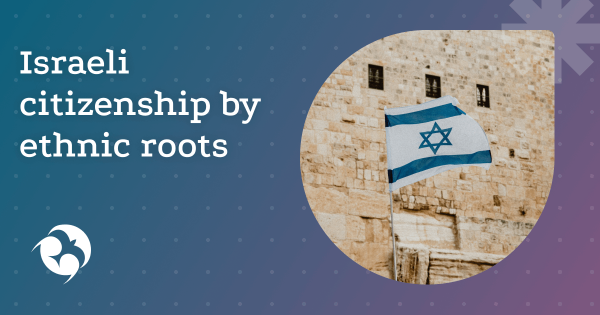Repatriation or aliyah refers to the return of Jews to their historical homeland– the Republic of Israel. This procedure is regulated by the Law “On Return”, which entered into force in 1950, and the documents of the Ministry of Aliyah and Integration. An important condition for repatriation is the ability to confirm one’s own belonging to the Jewish nation or close kinship with a person of this nationality.
The main advantages of Israeli citizenship
Having a passport from this country provides many opportunities for travel, education, medical treatment, and starting a business. Here are the most significant ones:
- visa–free visits to 161 countries, including the EU, Great Britain, North America and Japan;
- the opportunity to obtain a visa to the USA for a period of 10 years;
- high standard of living and high salaries;
- access to the financial sector (bank accounts, loans);
- simplified company registration, legal protection of businesses and many tax benefits for small commercial organizations;
- visits to clinics with an advanced level of medical services;
- access to Israeli education, which consistently holds high positions in world rankings.
Who is eligible for repatriation
According to the law on Return, aliyah to Israel is available to such categories of applicants from the former USSR and other countries.:
- Jews by definition of the law. They are considered to be the sons and daughters of women of this nationality and people who have converted to Judaism. In the second case, it means going through the gyura procedure.
- Descendants of Jews up to the third generation. That is, if a person’s grandmother, grandfather, or great-grandmother belonged to this nation, their grandchildren and great-grandchildren have the right to be repatriated.
- Spouses and their family members.
Widows of Jews who did not marry after their husband’s death, as well as adopted sons and daughters of representatives of this nationality, also have the right to aliyah.
How is Judaism defined
Belonging to the people is determined by the nationality of the mother. This means that the son and daughter of a Jewish woman are considered Jews. If maternal inheritance is not an appropriate option, a person can study Judaism and undergo religious rituals. After the giura procedure, he will be recognized as a Jew and allowed to repatriate.
If a different nationality is indicated in the passport or other document belonging to the mother, but the child has documentary evidence of her belonging to this nation, he may try to confirm his connection with Jews. In addition to an identity card, Jewishness can be established by a Soviet-style birth/marriage certificate, military ID, graduation diploma, party documents, house books, and personal files.
If the maternal grandmother was Jewish, and this was confirmed, then the relationship between the relatives and the applicant must be presented in the form of a family tree. You can order it from a company that provides an archive search service, or assemble it yourself in a free program. A prerequisite is to provide original documents for consular verification to confirm each of the links of kinship between the ancestors.
An alternative path for a non–Jew is to go through the giyur. The procedure itself is simple, but you have to prepare for it for several years. A candidate for Judaism will have to learn 613 laws of the Torah. The rabbinical religious court is responsible for verifying knowledge. His representatives talk to the person and determine whether he is ready to join the community, and how honest his intentions are. After talking with the rabbis, they perform ritual rituals and give a Jewish name.
Requirements for applicants
The main task of a candidate for repatriation is to collect evidence of Jewish origin, which will pass a consular check. It is necessary to add to the package of documents both the identity cards of the family intending to return to Israel, as well as papers relating to older relatives. There is no single list for everyone, because the history of each family is unique. It is necessary that a set of documents make the nationality of the ancestors and kinship with them indisputable. You can use old family photographs showing grandparents with Jewish religious paraphernalia, photographs of grave monuments in cemeteries, and any other evidence.
The modern method of confirming Jewish identity is genetic analysis. It will not be possible to do the test in the nearest laboratory: this procedure is initiated by the court. It allows the collection of material for analysis in the country of origin, with the condition that the sample is sent for testing to certain medical centers located in Israel. The results are reviewed at the consulate, and based on them, a decision is made on repatriation or denial of this right.
Application procedure
Returning to Israel based on belonging to the Jewish nation step by step looks like this:
- Preparation of documents. The basis of the case is everything that proves the origin and kinship with the Jewish ancestors. Nationality must be spelled out clearly. To these documents are added birth certificates of all those who are going to move to Israel with the applicant, an internal and foreign passport with a validity period of no more than six months, photographs of all family members measuring 3 x 4 cm, workbooks, military tickets. Each document is copied.
- Consular check. An employee of the diplomatic mission examines the case of the applicant and his relatives, asks about their ancestors and plans after moving. His task is to find out how strong the interlocutor’s ties with the Jewish world are, and whether he wants to make Israel the main place to live. To register for the consular check, you must fill out a questionnaire in Russian on the Native portal. This is the name of a government agency that verifies candidates for repatriates from the countries of the former Soviet Union. A scanned copy of the passport, marriage/divorce certificate, and everything else that confirms the right to repatriation are attached to the application. It is very important to enter the data without errors and specify the correct contacts for communication.
- Getting a visa and moving. After successfully passing the consular check, the applicant is approved for a repatriation visa. Its validity period is 6 months. During this time, the repatriate and his relatives contact Marom LLC to purchase plane tickets to Israel. They take all the documents that were attached to the questionnaire with them on the plane. They will be required to issue an identity card, get a job, and apply for financial support.
- Procedures at Ben Gurion Airport. After boarding the plane, the repatriate and his relatives are met by an employee of the Ministry of Aliyah and Integration. It will help you quickly check your passports and issue a set of primary documents.
- Obtaining a certificate of repatriation. At the airport, the repatriated family is given a Teudat ole certificate, which must be brought with them when visiting the Ministry of Aliyah and Integration or the Israeli Consulate abroad. The document allows ethnic Jews to receive various types of assistance from the state. Another mandatory certificate is Teudat zeut zmanit with a validity period of 9 months. During this time, the repatriate applies to the Department of the Ministry of Internal Affairs and requests an internal passport of Teudat Zeut.
Controversial situations
Denial of the right to repatriation may be related to the following factors:
- there is insufficient documentary evidence of the applicant’s Jewish affiliation;
- doubts about the person’s religious beliefs;
- the candidate for repatriation has been tried or is wanted by law enforcement agencies for violating the law;
- dangerous diseases or other circumstances have been identified, threatening public order;
- facts of forgery of documents and certificates or provision of false information have been revealed.
In any of these situations, it is important to act through a migration lawyer who knows how to properly file paperwork and challenge a refusal.

- We will answer all your questions
- We will help you choose the best option
- We will guide you through every step or do everything for you
Assistance in obtaining Israeli citizenship
Returning to Israel based on ethnicity is a multi–step process. The participation of a migration lawyer can prevent the appearance of inaccuracies in documents, refusals to review the case, and delays in certificates with a limited validity period. Aliyah review consultation in Israel is a free service. Leave a request for an analysis of your personal situation or comprehensive support of the procedure.






